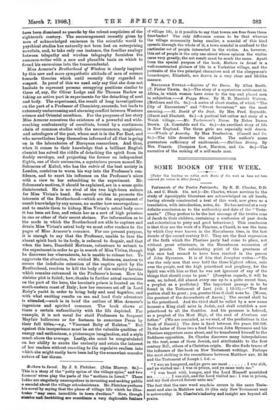SOME BOOKS Or THE WEEK.
[Under this heading we notice such Books of the week as have not been reserved for review in other for rns.1 Testaments of the Twelve Patriarchs. By R. H. Charles, D.D. (A. and C. Black. 15s. net.)—Dr. Charles, whose services to the study of Apocalyptic literature are acknowledged on all hands, having already constructed a text of this work, now gives us a translation, with introduction, notes, &c. He has arrived at a very definite conclusion as to the authorship and date of the " Testa- mente." (They profess to be the last message of the twelve sons of Jacob to their children, containing a confession of past deeds and exhortation to piety and good behaviour.) This conclusion is that they are the work of a Pharisee, a Chasid, to use the term by which they were known in the Maccabaean time, in the last decade of tjie second century B.C. They are the final expression of the faith which the Pharisee party had come to place, not without great reluctance, in the Maccabaean succession of high priests. The culminating point of the greatness of this race had seemed to have been reached in the person of John Hyrcanus. It is of him that Josephus writes :—" He was the only man that ever held the three highest offices, rule over the people, and the high priesthood and prophecy, for the Spirit was with him so that he was -not ignorant of any of the things that should come to pass." (Josephus regards, it will be seen, as, indeed, did almost every one up to a quite recent time, a prophet as a predictor.) The important passage is to be found in the Testament of Levi (viii. § 12-15) :—" The first portion shall be great ; yea, greater than it shall none be. [Moses, the greatest of the descendants of Aaron.] The second shall be in the priesthood. And the •third shall be called by a new name because a Bing shall arise in Judah, and shall establish a new priesthood to all the Gentiles. And his presence is beloved, as a prophet of the Most High, of the seed of Abraham our father." (We are reminded, as we read, of the predictions in the Book of Daniel.) The date is fixed between the years 109-105. In the latter of these two a feud between John Hyrcanus and his Pharisee supporters came about, and he transferred himself to the Sadducee opposition. Dr. Charles discovers many interpolations in the text, some of them Jewish, and attributable to the first century B.C., others of a Christian origin. He also finds traces of the influence of the book on New Testament writings. Perhaps the most striking is the resemblance between Matthew xxv. 85-36 and the Testament of Joseph i. 5-6: -
°` I was an hungered, and ye have me meat I was sick, and ye visited me : I was in prison, and ye came unto me."
" I was beset with hunger, and the Lord Himself nourished me I was sick, and the Lord visited me : I was in prison, and my God showed favour unto me."
The fact that the rare word irar3e4o1 occurs in the same Testa- • ment and also in Matthew xxii. 15 (the only New Testament use) is noteworthy. Dr. Charles's industry and insight are beyond all praise.














































 Previous page
Previous page